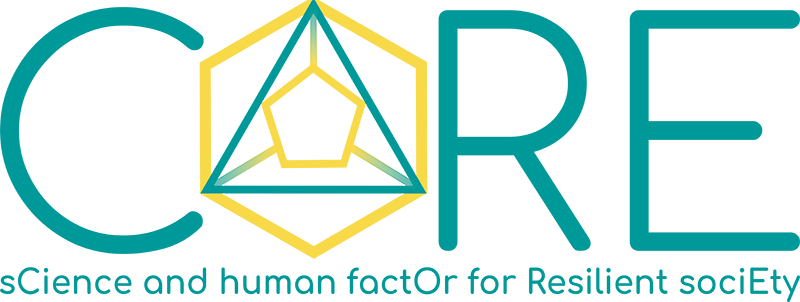CORE (sCience& human factOr for Resilient sociEty) responds to the call SU-DRS01-2018-2019-2020 -Human factors, and social, societal, and organisational aspects for disaster-resilient societies. It is built on the activities and results of previous and on-going projects and is driven by end-users within the consortium and their wider stakeholder networks. The project will analyze specific risks of natural and anthropogenic origin including cascade effects. In particular, the project will analyze different disaster scenarios including earthquake, tsunami, forest and wildland fires, flash flood, terrorist attack, industrial accident and the Covid-19 pandemic that will be used as a benchmark case. In this project there will be a specific focus on needs of the most vulnerable people to make them aware and prepared towards disaster risks and during major incidents and disasters. Emergency measures should seek to reserve the dignity and (where possible) the autonomy of people with disabilities. The project will also investigate the social media role in disaster management by paying particular attention to ethical concerns. These ethical concerns are related to the potential impact of social media on human autonomy, dignity, integrity and vulnerability, but also on how these social networks could affect equity and justice, freedom or be harmful to humans. Recommendations and guidelines that will be provided by CORE will foster the development of a culture of improved preparedness, adaptability, and resilience to risks that will accommodate a variety of human and social characteristics and vulnerabilities.
GOALS
Measure, Control, Mitigate
CORE is a multi-disciplinary consortium across and outside Europe established to understand how to define common metrics with respect to the different natural and man-made disaster scenarios, and how to measure, control and mitigate the impact on the populations. It aims at providing the fundamental knowledge to enhance awareness, knowledge and actions on the role of human factors, social, societal and organisational aspects in risk awareness, risk perception, disaster risk management and recovery of communities from disasters, including the role of these factors in cascading effects.
PILLARS
Hard Science, Social Science, Societal Acceptance
CORE will provide a harmonized resilience planning framework that handles risk vulnerability and resilience building based on advanced data knowledge and management including data relating to human, social and societal factors in both affected population and responders. This can be achieved through a collaboration between hard and social science and investigating the key factors that contribute to acceptance – or lack of - in terms of technological, historical, social and economic factors.
BUILDING BLOCKS
Safety Culture; Social media support and threats to safety culture and community resilience; Disaster scenarios, human behaviour & disaster; Community identity as resilience factor; Cascading effects Governance
In the Disaster Risk Reduction context, culture and safety culture are the framework that enable individuals and organizations to reach an appropriate risk awareness, to benefit from shared knowledge and practices, to engage themselves in cooperative, and finally more effective, disaster management. In this framework, the project methodology will rely on the following building blocks:
- Safety Culture;
- Social media support and threats to safety culture and community resilience;
- Disaster scenarios, human behaviour& disaster;
- Community identity as resilience factor;
- Cascading effects;
- Governance.
